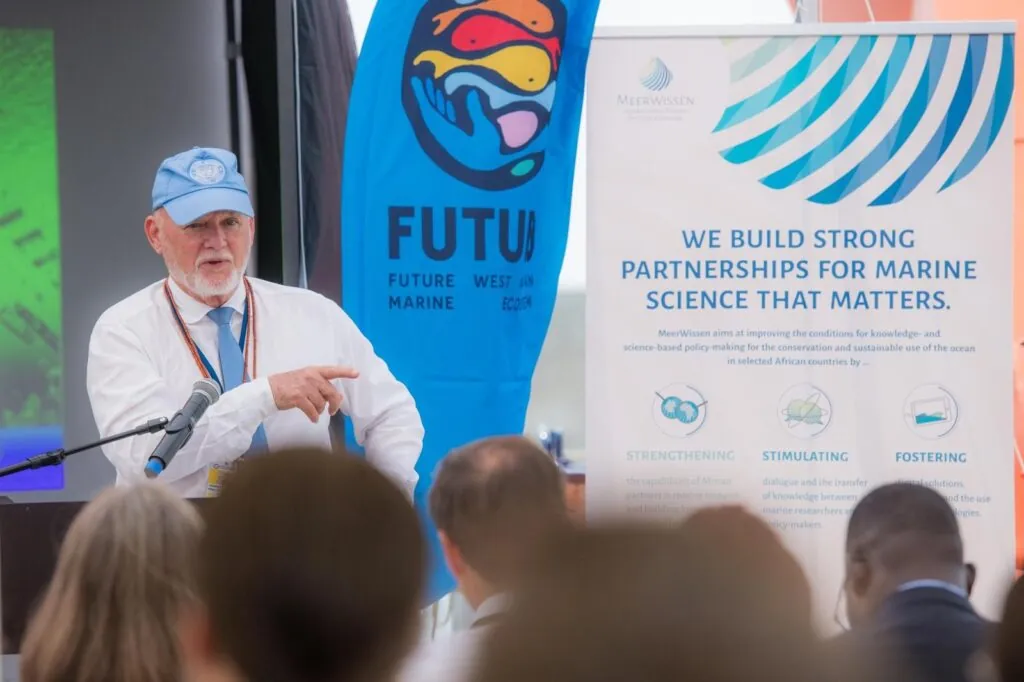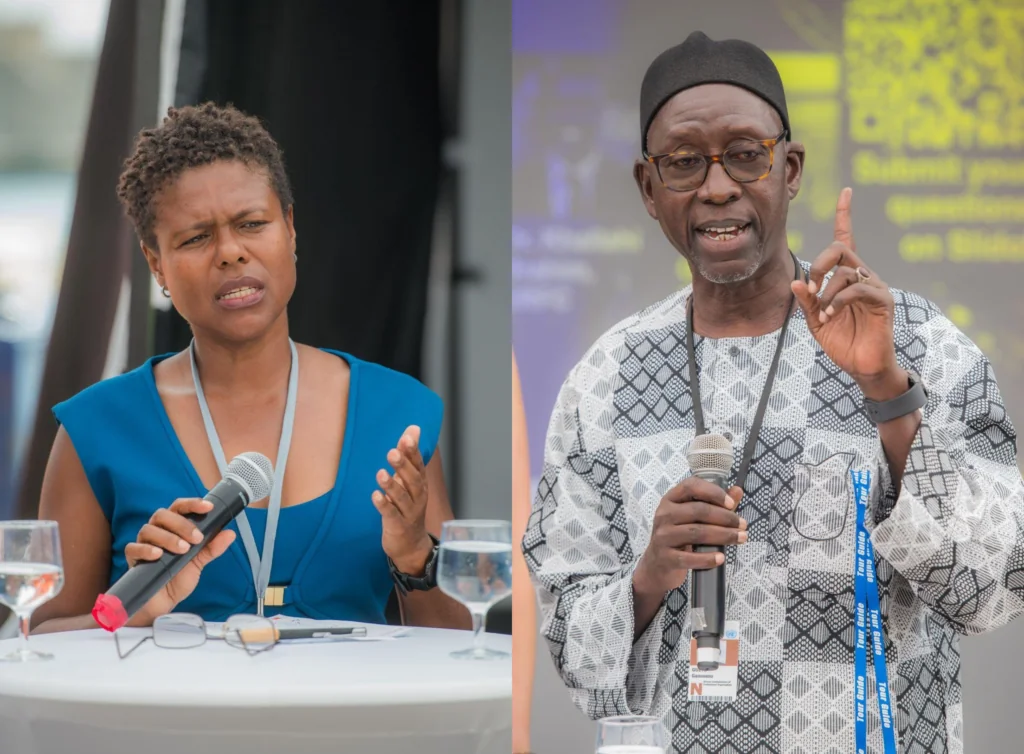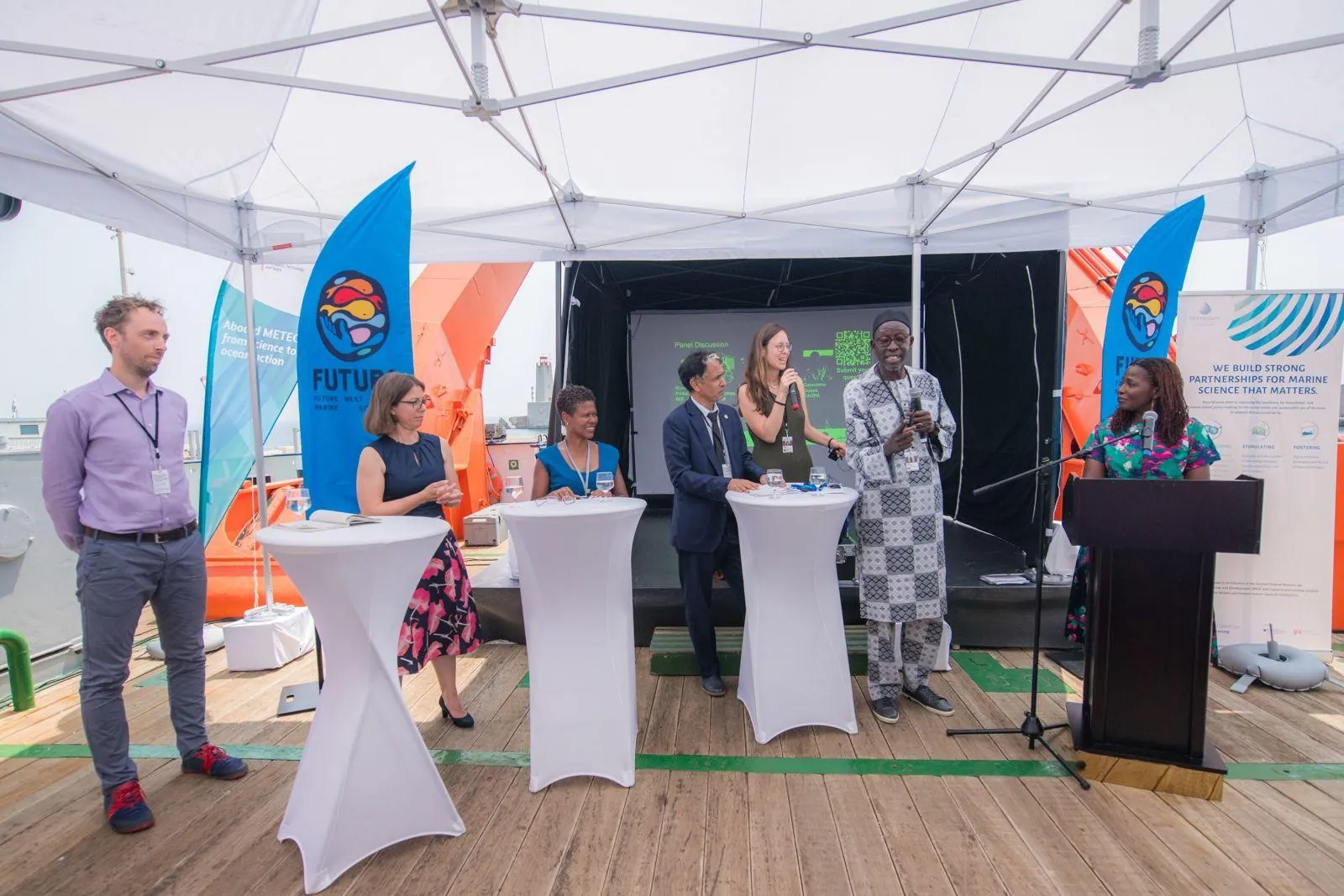On 10 June 2025, a diverse group of experts from science, policy and civil society came together for the side event “Bridging Science, Policy and Society for sustainable ocean management in Africa – MeerWissen and Future West African Marine Ecosystem (FUTURO)” aboard the German research vessel METEOR at Nice Harbour as part of the Third UN Ocean Conference in Nice 2025 (UNOC3).
The event, co-organised by the German Federal Ministry for Economic Cooperation and Development (BMZ), the Deutsche Gesellschaft für Internationale Zusammenarbeit (GIZ), the Helmholtz Centre for Ocean Research Kiel (GEOMAR) and the Intergovernmental Oceanographic Commission Sub Commission for Africa and the Adjacent Island States (IOC-Africa), aimed to foster dialogue on how co-designed, science-based solutions can strengthen marine conservation and sustainable ocean governance in West Africa.
The welcome remarks included contributions by, among others, Peter Grönwoldt (German Federal Ministry of Research, Technology and Space, BMFTR) and Dr. Andreas Schaumayer (BMZ). High-level speakers Peter Thomson (UN Special Envoy for the Ocean) and HE Eng Jorge Santos (Cabo Verde’s Minister of the Sea) emphasised the importance of collaboration and evidence-based policymaking to meet Sustainable Development Goal 14 (SDG 14, Life Below Water).
“We all know that science-based management is the only way forward“.
Ambassador Peter Thomson, United Nations Secretary-General’s Special Envoy for the Ocean

The presentations of the two initiatives followed: ‘MeerWissen – Impacts, Partnerships and Sustainability’ presented by Sven Stöbener (GIZ) and ‘FUTURO – Future West African Marine Ecosystem’ presented by Prof. Dr. Arne Körtzinger (GEOMAR). FUTURO was officially endorsed by Ibukun Adewumi (Head of IOC-Africa) as a UN Ocean Decade Action, stating:
“If we can really observe the ocean better, we can govern it better. And if we govern it better, we can live better“.
Ibukun Adewumi, Head of IOC-AFRICA
The panel discussed the co-design approach as a driver for inclusive, impactful solutions and gathered perspectives from across sectors:
- Gunnar Finke (GIZ) stressed that the ‘society’ element in the science-policy-society interface is too often neglected. Putting people at the centre means building trust, relationships, and mutual understanding. It is critical to design research questions in a way that societal challenges are tackled.
- Assist. Prof. Dr. Corrine Almeida (Universidade Técnica do Atlântico) highlighted the inequity in how ocean benefits are distributed globally: We all share the ocean, but not all share the benefits. Ocean responsibility must be global. She emphasised the need to bridge language and understanding gaps between scientists, policymakers and communities.
- Gaoussou Gueye (African Confederation of Professional Organizations of Artisanal Fisheries, CAOPA) pointed to the lack of feedback loops between science and local communities: Researchers collect data and leave – but the communities are rarely informed of the outcomes. He stressed that fishers possess deep traditional knowledge and must be acknowledged as key actors.
- Dr. Khallahi Brahim (United Nations Food and Aquaculture Organisation Sub-Regional Fisheries Commission, SRFC) talked about the value of involving the private sector, especially in funding sustainable fisheries initiatives: Fishers must be recognised as professionals and conservation partners. Once the private sector understands this, they will invest in long-term sustainability.

What must change? Audience questions focused on how initiatives like FUTURO can generate lasting impact and ensure the meaningful inclusion of relevant stakeholders in sustainable ocean management. The responses pointed out, for example, that there are still few marine science faculties in West Africa. To achieve meaningful and sustained capacity development in the region, projects like FUTURO should support both academic training and long-term career prospects in equal measure.
The closing reflections echoed a shared need for alignment, transparency and inclusive communication. Prof. Dr. Katja Matthes (GEOMAR) called for solution-oriented research, co-designed from the start, with fishers, policy, economy and science working side by side. The key takeaways from this side event were:
- Research should align with development goals or priorities.
- Scientific knowledge must complement traditional knowledge. Traditional knowledge must be valued as a central knowledge source.
- Mutual understanding and trust are essential to inclusive collaboration and long-term impact.
- As we advance research and cooperation, we have to ensure that the capacities built remain in Africa and create lasting impact.
- Co-design is a central approach to address these challenges at the science-policy-society interface.
In the final moments of the event, moderator Dr. Edem Mahu (University of Ghana) summarised the collective spirit aboard the METEOR with a clear call to action: While the session was rich in insights and ambition, it must not end with words alone. Ambitions should turn into commitments, and commitments into actions. Achieving a healthy ocean and resilient coastal communities will require not only investment in challenge-oriented research, but also enabling the people of the region to act as stewards of their ocean and coasts, learning from them, and working alongside them.
Learn more about the MeerWissen co-design approach and the FUTURO campaign.

